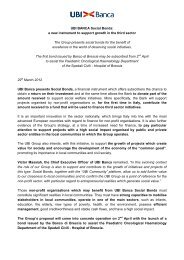Prospectus UBI Banca Covered Bond Programme
Prospectus UBI Banca Covered Bond Programme
Prospectus UBI Banca Covered Bond Programme
Create successful ePaper yourself
Turn your PDF publications into a flip-book with our unique Google optimized e-Paper software.
<strong>Prospectus</strong><br />
Catastrophic events, terrorist attacks and similar events could have a negative impact on the business and<br />
results of the Issuer<br />
Catastrophic events, terrorist attacks and similar events, as well as the responses thereto, may create economic<br />
and political uncertainties, which could have a negative impact on economic conditions in the regions in which<br />
the Issuer operates and, more specifically, on the business and results of the Issuer in ways that cannot be<br />
predicted.<br />
Adverse regulatory developments including changes in tax laws<br />
The Issuer conducts its businesses subject to ongoing regulatory and associated risks, including the effects of<br />
changes in laws, regulations, and policies in Italy. The timing and the form of future changes in regulation are<br />
unpredictable and beyond the control of the Issuer, and changes made could materially adversely affect the<br />
Issuer's business.<br />
The Issuer is required to hold a licence for its operations and is subject to regulation and supervision by<br />
authorities in Italy and in all other jurisdictions in which it operates. Extensive regulations are already in place<br />
and new regulations and guidelines are introduced relatively frequently. Regulators and supervisory authorities<br />
seem to be taking an increasingly strict approach to regulations and their enforcement that may not be to the<br />
Issuer's benefit. A breach of any regulations by the Issuer could lead to intervention by supervisory authorities<br />
and the Issuer could come under investigation and surveillance, and be involved in judicial or administrative<br />
proceedings. The Issuer may also become subject to new regulations and guidelines that may require additional<br />
investments in systems and people and compliance with which may place additional burdens or restrictions on<br />
the Issuer. For example, the Basel Committee on Banking Supervision of the Bank for International Settlements<br />
has developed new international capital adequacy guidelines commonly known as Basel II. These guidelines<br />
were endorsed by central bank governors and the heads of bank supervisory authorities in the Group of Ten<br />
(G-10) countries in June 2004. The Capital Requirements Directive, representing the translation of Basel II into<br />
EU legislation was adopted by the EU institutions in Autumn 2005. The Capital Requirements Directive was<br />
implemented in Italy on 27 December 2006 although part will come into effect on a later date. The guidelines<br />
require banks to make a choice of an approach to capital requirements related to risk levels. Should the Issuer not<br />
be able to implement the approach to capital requirements it considers optimal, it may be required to maintain<br />
levels of capital which could potentially impact its credit ratings, funding conditions and limit the Issuer's growth<br />
opportunities.<br />
A downgrade of any of the Issuer's credit ratings may impact the Issuer's funding ability and have an adverse<br />
effect on the Issuer's financial condition<br />
The current long and short-term counterparty credit ratings of the Issuer are, respectively, "A" from Fitch, "A-1"<br />
from Moody's and "A" from S&P and "F1" from Fitch, "P-1" from Moody's and "A-1" from S&P. A downgrade<br />
of any of the Issuer's ratings (for whatever reason) might result in higher funding and refinancing costs for the<br />
Issuer in the capital markets. In addition, a downgrade of any of the Issuer's ratings may limit the Issuer's<br />
opportunities to extend mortgage loans and may have a particularly adverse affect on the Issuer's image as a<br />
participant in the capital markets, as well as in the eyes of its clients. These factors may have an adverse affect<br />
on the Issuer's financial condition and/or results of operations.<br />
Investment Considerations relating to the Guarantor<br />
Guarantor only obliged to pay Guaranteed Amounts when they are due for payment<br />
Following service of an Issuer Default Notice on the Issuer and the Guarantor, under the terms of the <strong>Covered</strong><br />
<strong>Bond</strong> Guarantee the Guarantor will only be obliged to pay Guaranteed Amounts as and when the same are due<br />
for payment on each Interest Payment Date, provided that, in the case of any amounts representing the Final<br />
Redemption Amount due and remaining unpaid as at the original Maturity Date, the Guarantor may pay such<br />
amounts on any Interest Payment Date thereafter, up to (and including) the Extended Maturity Date and in the<br />
case of <strong>Covered</strong> <strong>Bond</strong>s whose principal is payable in instalments, the Guarantor may defer such instalments for a<br />
period of one year until the relevant Extended Instalment Date. Such Guaranteed Amounts will be paid subject to<br />
and in accordance with the Guarantee Priority of Payments or the Post-Enforcement Priority of Payments, as<br />
applicable. In these circumstances the Guarantor will not be obliged to pay any other amounts in respect of the<br />
<strong>Covered</strong> <strong>Bond</strong>s which become payable for any other reason.<br />
Subject to any grace period, if the Guarantor fails to make a payment when due for payment under the <strong>Covered</strong><br />
<strong>Bond</strong> Guarantee or any other Guarantor Event of Default occurs, then the Representative of the <strong>Covered</strong><br />
- 27 -
















